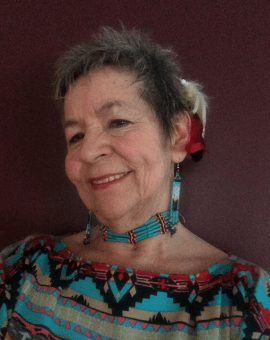Content/trigger warning: The following article includes information about residential schools, violence against children, intergenerational trauma, systemic and structural racism and oppression and the ongoing impact of colonialism. Readers are encouraged to seek support if needed.
Last year, Rita May Fenton stumbled upon her dream journal from 2012. She had a dream about living in a big house with many people coming to visit, called “The Healing Place.”
“I’ve always wanted to have a teepee in my backyard and people coming for healing,” she said.
With the support of the community, Rita set out on realizing her dream. Enough money was raised through fundraisers and donations to purchase a teepee to construct in her backyard on Anemki Wajiw (Fort William First Nation). While the teepee was being raised, three eagles flew overhead, and when it was finished there were two more.
“It was a beautiful sight seeing the eagles, soaring above – a sign that this was a spiritual thing, and the Creator was blessing this Space,” remembered Rita, whose Anishinaabe spirt name, Migisi Ikwe, means “Eagle Woman.”
A few months later, Rita hosted the grand opening for The Healing Place in her backyard, which would be open to anyone who wanted help. The ceremony was attended by many dignitaries, including Alvin Fiddler, the former Grand Chief of the Assembly of First Nations, and Sol Mamakwa, the Member of Provincial Parliament representing the riding of Kiwetinoong, as well as representatives from the media.
The Healing Place was more than a personal accomplishment for Rita. It was also a reminder of how far she had come in her journey – from the throes of addiction towards a path of healing and rediscovery of a culture that was taken away from her.
Missing Bay Indian Day School
Growing up, Rita knew very little about her Anishinaabe culture and history. She attended Mission Bay Indian Day School – a day school run by the Catholic Church – which was part of a system that actively sought to eliminate Indigenous identity, including language and culture. Though she was a Catholic at the time, she never felt accepted by settler Canadian society.
“The high school white kids called me names like ‘squaw’ and ‘stupid Indian,’” she reflected.
The experience left a hole in her soul. By the time she was 17, she had quit school and was pregnant. She also had an alcohol addiction and was caught in a vicious cycle of abuse.
The Indian Residential School System (IRSS) is a shameful part of Canada’s history, which saw the forcible removal of Indigenous children from their families and culture. The schools they were sent to were rife with physical and sexual abuse, neglect and – as seen in the recent uncovering of mass graves across the country – death. Residential and day schools were created as a means to assimilate – or “civilize” – Indigenous peoples into settler society.
“In order to educate the (Indigenous) children properly we must separate them from their families,” Sir Hector Langevin, a father of Canadian Confederation, said in a shocking quote to Parliament in 1883. “Some people may say this is hard, but if we want to civilize them, we must do that.”
The legacy of the residential school system, along with ongoing systemic racism, continues to have a devasting impact on survivors and on their descendants in the form of intergenerational trauma. Indigenous peoples are much more likely to experience poverty, negative health outcomes, incarceration and violence than non-Indigenous populations. Suicide rates, for example, are three times higher amongst First Nations communities than the Canadian average. This is only one of many disturbing statistics.
The path of healing and rediscovery

After Rita hit rock bottom in her thirties, her life took a turn for the better. She enrolled in Indigenous-focussed courses at Confederation College where she started to learn about the history of the Anishinawbe people. When she danced in her first powwow, tears began streaming down her face as she felt for the first time a connection to her spirit. She embraced her Indigeneity, her sense of belonging and knowing who she was inside. She was an Anishinawbe. She felt proud of who she was and no longer felt the shame that was so deeply ingrained in her from her childhood.
“It was a real awesome program,” she says. “I got in touch with my feelings, including anger, and began decolonizing my mind. I learned more about my culture, about smudging to take away negative energy, made moccasins and skirts, met Elders, and took part in a women’s drum circle every Wednesday evening.”
The positive experiences throughout Rita’s life have helped her overcome her addiction and gave her a higher purpose. She wanted to help those in her community, many of whom suffer from the impacts of the IRSS. She became a registered social worker. She went on to complete her honours bachelor of social work degree at Lakehead University in 2001. In 2017, at the age of 69, she completed her masters in social work.
“Without the education and knowledge of my history, without the counselling and dealing with those horrifying experiences, I wouldn’t be able to do the work that I’ve done throughout the years,” she said. “I now use my lifelong experiences to help all people I come into contact with.”
Now, as she approaches retirement, Rita continues to serve her community and advocate for social justice. She recently travelled to Alberta to represent IRSS survivors during Pope Francis’ visit and continues to support survivors on different Elder advisory committees. Though she believes strongly that much, much more needs to be done when it comes to truth and reconciliation, Rita remains confident in the strength of her community.
“Our ancestors and generations afterward were stripped of our rights, our identity, our language and our culture,” she said. “Our ancestors were very resilient and were strong, and without their resiliency and strength, we would not be here. But our beautiful spirits – that fire that is within each and everyone of us – remained. Nothing can ever take that away from us. We are resilient and strong. And we are still here.”
Important note: The Indian Residential School Crisis Line provides support for former students and those affected. Individuals can access emotional and crisis referral services by calling the 24-hour national crisis line: 1-866-925-4419.
The College would like to thank Rita for speaking with us and sharing her experiences.

